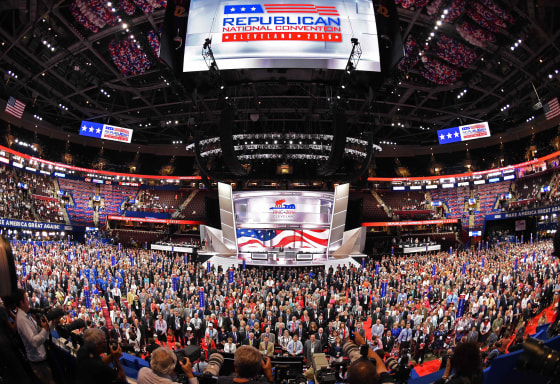CLEVELAND, Ohio — A few years back, Tina Maharath’s friend was fatally shot in a parking lot in Columbus, Ohio. No one knew who killed him, so Maharath sought help from a state legislator who tried to get answers, she told NBC News.
That interaction with an elected official cemented the 25-year-old Lao American’s interest in running for office, a dream she said she hopes to achieve in November 2018.
“I want to make sure our voices are heard,” said Maharath, an Ohio field fellow at APIAVote who wants to be an Ohio state representative.

Maharath was one of several dozen Asian Americans and Pacific Islanders who attended an APIAVote briefing Monday afternoon emceed by MSNBC anchor Richard Lui in Cleveland, Ohio, where the Republican convention kicked off Monday. The briefing introduced attendees to the results of a survey on Asian American and Pacific Islander (AAPI) voting trends and issues, and also made a pitch to AAPIs to run for office.
“We’ve been doing this at the [Democratic] and [Republican] conventions ever since 2008, with the whole idea that we need to uplift the voices and the AAPI electorate to the political parties and the presidential campaigns,” APIAVote executive director Christine Chen told the audience.
According to the survey of 1,212 Asian-American registered voters, released in May by three nonpartisan advocacy groups, respondents had a more favorable view of the Democratic party and presumptive Democratic nominee Hillary Clinton than of the GOP and presumptive Republican nominee Donald Trump.
RELATED: Asian-American Voters Tip Toward Dems Headed into 2016 Election: Study
But the survey also found that nearly two in five registered AAPI voters did not identify with a party. That segment of the AAPI electorate, which overall accounted for 3.8 percent of voters in the last presidential contest, could swing elections on the local, state, and national levels.
“So there is an opportunity here for the campaigns to work on this and develop our relationships,” said Chen, adding that many AAPIs often don’t understand the differences between Democrats and Republicans.
Sayu Bhojwani, founder and president of the New American Leaders Project, said it's important to discuss new Americans, immigrants, and people of color not just in terms of outreach programs. One way her organization accomplishes this, she said, is by training immigrants of all racial and ethnic backgrounds over the course of a weekend on how to run for elected office.
“We need to figure out better strategies to build power in the absence of large numbers,” Bhojwani said, referring to the AAPI electorate.
Azaadjeet Singh, the first Sikh to serve on the Council for the Village of Woodmere, a suburb of Cleveland, told NBC News at the briefing that he feels both parties don’t care about the AAPI electorate — unless it’s time to vote, to recruit volunteers, or to solicit donations.
“Then they use us and they throw us out,” he said. “Then four years later they appear.”

For attendee Sungkwan Jang, a 25-year-old Korean American living in New Jersey, coming to Cleveland this week was important to show the GOP that AAPI voters are also Americans and that they are not passive and silent.
“I feel like a lot of Republicans, or the Republican establishment, assume that if you’re an immigrant or if you speak another language, then that by default doesn’t make you American,” Jang, program coordinator of Korean American Civic Empowerment, a nonpartisan advocacy group in the greater New York area, told NBC News. “And I wholeheartedly disagree with that.”
RELATED: Republican Diversity Coalition Plans Trump Election Strategy
The GOP has seen support from the AAPI electorate steadily wane since 1992, a year when 55 percent of Asian Americans voted for Republican President George H.W. Bush, according to Cornell's Roper Center. For its part, the Republican party has sought to reclaim the AAPI voting bloc, creating a grassroots field program three years ago to win back an electorate that is expected to double by 2040.
Asked whether he, like Maharath from Ohio, would consider running for office, Jang, whose organization helps register Korean-American voters, said he doesn’t see it in the cards anytime soon.
“Maybe in, like, 20 or 30 years,” he said.
Follow NBC Asian America on Facebook, Twitter, Instagram, and Tumblr.
